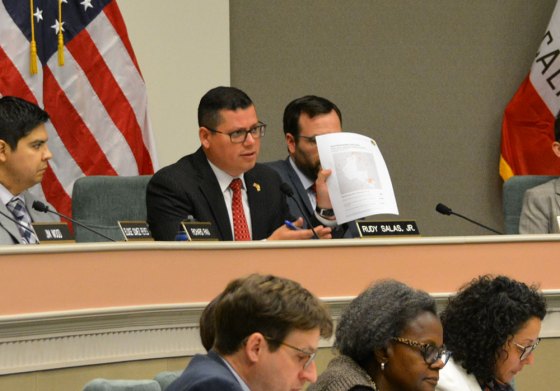Asssembly's Rudy Salas joins forces as child lead poisoning bill heads to gov's desk

This bill is the combined effort of the assembly's Salas, Garcia, and Reyes.
"Millions of children are at risk of lead poisoning and need to be tested," said Salas. "This legislation ensures that we are protecting our most vulnerable kids from lead poisoning and providing the help they need."
AB 2276 requires the Childhood Lead Poisoning Prevention Program (CLPPP) operated by the California Department of Public Health (CDPH) to add risk factors such as a child's residency in a high-risk zip code and a child's proximity to current or former lead-producing facilities, that will require blood lead level testing for children by medical professionals. Also, CDPH will be required to allocate funds more equitably by updating its funding formula based on the most recent data for the number of children with elevated blood lead levels in each jurisdiction to ensure a more fair allocation of funds.
"Assembly Bill 2276 is the result of three authors coming together and combining their lead bill package into one cohesive and important measure," said Garcia. "AB 2276 requires CDPH to revise its funding formula to reflect the most recent scientific data regarding childhood lead exposure, to more equitably distribute funds. In addition, AB 2276 adds risk factors that require blood lead level testing when healthcare professionals screen children."
A study from Duke University found that for every 5-microgram increase in blood lead, a person lost about 1.5 IQ points. Several studies have demonstrated childhood lead exposure has been associated with toxic effects on the immune system, which can lead to higher infection rates of COVID-19.
California ranks 31st among states in the nation for providing lead tests to 1- and 2- year-old children. When the State Auditor's Office reviewed data maintained by the Department of Health Care Services (DHCS), they found that the rate of eligible children receiving the proper lead tests was less than 27 percent. Without these tests, health care providers do not know whether these children are suffering from elevated lead levels and need treatment.
"Lead exposure silently steals away the aspiration of our children with debilitating health and developmental effects that can lead to long term and disastrous consequences," said Reyes. "AB 2276 will create mechanisms to ensure that California's children are receiving their required blood lead tests and related services so that we can protect and treat them before it is too late. California's children deserve every chance and opportunity to grow up without fear of exposure to toxic chemicals."
AB 2276 will now be sent to the Governor's desk, where the bill can officially be signed into law.
Politics
- Lemoore City Council appoints John Garza to the vacant District B seat
- Lemoore City Council seeks to fill vacant District B council position by March 31
- Councilman Jim Chaney, resigns council position, due to relocation
- Valadao urges President Biden, Newsum that recent rains don't go to waste
- Council appoints Patricia Matthews mayor, Frank Gornick pro tem
- Neves, Solis retain seats as Kings County officials conclude counting votes Updated 2 years ago
_0.jpg)

.jpg)



